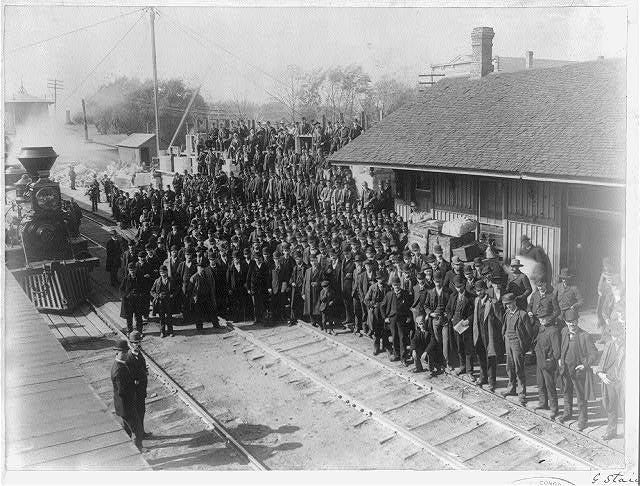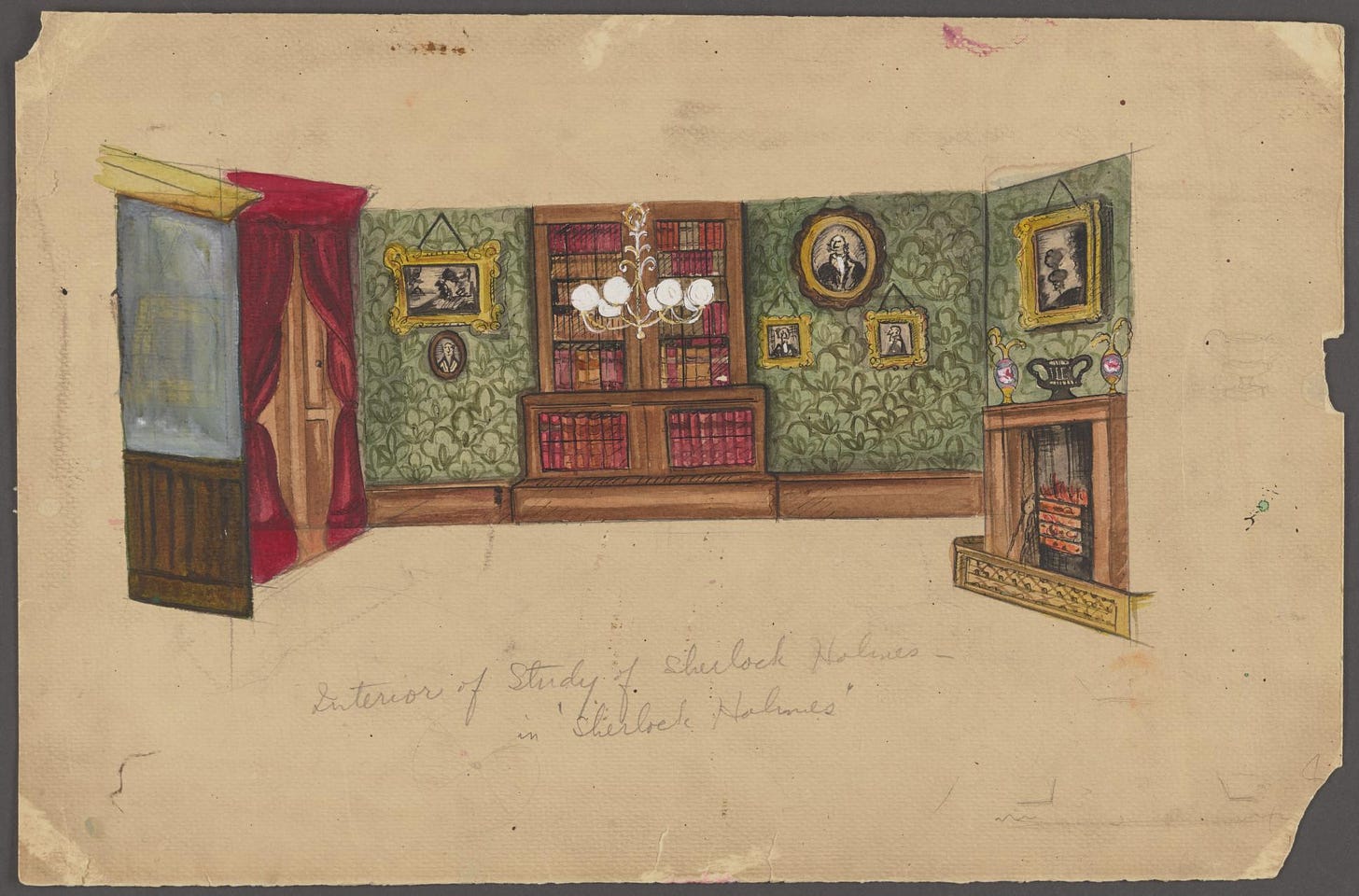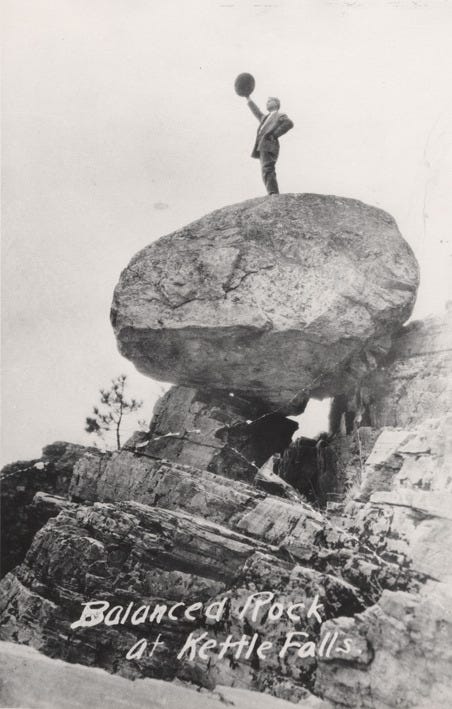LibriVox recording: 17:10-34:16
“That was my singular interview with Professor Moriarty. I confess that it left an unpleasant effect upon my mind. His soft, precise fashion of speech leaves a conviction of sincerity which a mere bully could not produce. Of course, you will say: ‘Why not take police precautions against him?’ The reason is that I am well convinced that it is from his agents the blow will fall. I have the best proofs that it would be so.”
“You have already been assaulted?”
“My dear Watson, Professor Moriarty is not a man who lets the grass grow under his feet. I went out about midday to transact some business in Oxford Street. As I passed the corner which leads from Bentinck Street on to the Welbeck Street crossing a two-horse van furiously driven whizzed round and was on me like a flash. I sprang for the foot-path and saved myself by the fraction of a second. The van dashed round by Marylebone Lane and was gone in an instant. I kept to the pavement after that, Watson, but as I walked down Vere Street a brick came down from the roof of one of the houses, and was shattered to fragments at my feet. I called the police and had the place examined. There were slates and bricks piled up on the roof preparatory to some repairs, and they would have me believe that the wind had toppled over one of these. Of course I knew better, but I could prove nothing. I took a cab after that and reached my brother’s rooms in Pall Mall, where I spent the day. Now I have come round to you, and on my way I was attacked by a rough with a bludgeon. I knocked him down, and the police have him in custody; but I can tell you with the most absolute confidence that no possible connection will ever be traced between the gentleman upon whose front teeth I have barked my knuckles and the retiring mathematical coach, who is, I daresay, working out problems upon a blackboard ten miles away. You will not wonder, Watson, that my first act on entering your rooms was to close your shutters, and that I have been compelled to ask your permission to leave the house by some less conspicuous exit than the front door.”
I had often admired my friend’s courage, but never more than now, as he sat quietly checking off a series of incidents which must have combined to make up a day of horror.
“You will spend the night here?” I said.
“No, my friend, you might find me a dangerous guest. I have my plans laid, and all will be well. Matters have gone so far now that they can move without my help as far as the arrest goes, though my presence is necessary for a conviction. It is obvious, therefore, that I cannot do better than get away for the few days which remain before the police are at liberty to act. It would be a great pleasure to me, therefore, if you could come on to the Continent with me.”
“The practice is quiet,” said I, “and I have an accommodating neighbour. I should be glad to come.”
“And to start to-morrow morning?”
“If necessary.”
“Oh yes, it is most necessary. Then these are your instructions, and I beg, my dear Watson, that you will obey them to the letter, for you are now playing a double-handed game with me against the cleverest rogue and the most powerful syndicate of criminals in Europe. Now listen! You will dispatch whatever luggage you intend to take by a trusty messenger unaddressed to Victoria to-night. In the morning you will send for a hansom, desiring your man to take neither the first nor the second which may present itself. Into this hansom you will jump, and you will drive to the Strand end of the Lowther Arcade, handing the address to the cabman upon a slip of paper, with a request that he will not throw it away. Have your fare ready, and the instant that your cab stops, dash through the Arcade, timing yourself to reach the other side at a quarter-past nine. You will find a small brougham waiting close to the curb, driven by a fellow with a heavy black cloak tipped at the collar with red. Into this you will step, and you will reach Victoria in time for the Continental express.”
“Where shall I meet you?”
“At the station. The second first-class carriage from the front will be reserved for us.”

“The carriage is our rendezvous, then?”
“Yes.”
It was in vain that I asked Holmes to remain for the evening. It was evident to me that he thought he might bring trouble to the roof he was under, and that that was the motive which impelled him to go. With a few hurried words as to our plans for the morrow he rose and came out with me into the garden, clambering over the wall which leads into Mortimer Street, and immediately whistling for a hansom, in which I heard him drive away.
In the morning I obeyed Holmes’s injunctions to the letter. A hansom was procured with such precaution as would prevent its being one which was placed ready for us, and I drove immediately after breakfast to the Lowther Arcade, through which I hurried at the top of my speed. A brougham was waiting with a very massive driver wrapped in a dark cloak, who, the instant that I had stepped in, whipped up the horse and rattled off to Victoria Station. On my alighting there he turned the carriage, and dashed away again without so much as a look in my direction.
So far all had gone admirably. My luggage was waiting for me, and I had no difficulty in finding the carriage which Holmes had indicated, the less so as it was the only one in the train which was marked “Engaged.” My only source of anxiety now was the non-appearance of Holmes. The station clock marked only seven minutes from the time when we were due to start. In vain I searched among the groups of travellers and leave-takers for the lithe figure of my friend. There was no sign of him. I spent a few minutes in assisting a venerable Italian priest, who was endeavouring to make a porter understand, in his broken English, that his luggage was to be booked through to Paris. Then, having taken another look round, I returned to my carriage, where I found that the porter, in spite of the ticket, had given me my decrepit Italian friend as a traveling companion. It was useless for me to explain to him that his presence was an intrusion, for my Italian was even more limited than his English, so I shrugged my shoulders resignedly, and continued to look out anxiously for my friend. A chill of fear had come over me, as I thought that his absence might mean that some blow had fallen during the night. Already the doors had all been shut and the whistle blown, when—
“My dear Watson,” said a voice, “you have not even condescended to say good-morning.”
I turned in uncontrollable astonishment. The aged ecclesiastic had turned his face towards me. For an instant the wrinkles were smoothed away, the nose drew away from the chin, the lower lip ceased to protrude and the mouth to mumble, the dull eyes regained their fire, the drooping figure expanded. The next the whole frame collapsed again, and Holmes had gone as quickly as he had come.
“Good heavens!” I cried. “How you startled me!”
“Every precaution is still necessary,” he whispered. “I have reason to think that they are hot upon our trail. Ah, there is Moriarty himself.”
The train had already begun to move as Holmes spoke. Glancing back, I saw a tall man pushing his way furiously through the crowd, and waving his hand as if he desired to have the train stopped. It was too late, however, for we were rapidly gathering momentum, and an instant later had shot clear of the station.
“With all our precautions, you see that we have cut it rather fine,” said Holmes, laughing. He rose, and throwing off the black cassock and hat which had formed his disguise, he packed them away in a hand-bag.
“Have you seen the morning paper, Watson?”
“No.”
“You haven’t seen about Baker Street, then?”
“Baker Street?”
“They set fire to our rooms last night. No great harm was done.”

“Good heavens, Holmes! This is intolerable.”
“They must have lost my track completely after their bludgeon-man was arrested. Otherwise they could not have imagined that I had returned to my rooms. They have evidently taken the precaution of watching you, however, and that is what has brought Moriarty to Victoria. You could not have made any slip in coming?”
“I did exactly what you advised.”
“Did you find your brougham?”
“Yes, it was waiting.”
“Did you recognise your coachman?”
“No.”
“It was my brother Mycroft. It is an advantage to get about in such a case without taking a mercenary into your confidence. But we must plan what we are to do about Moriarty now.”
“As this is an express, and as the boat runs in connection with it, I should think we have shaken him off very effectively.”
“My dear Watson, you evidently did not realize my meaning when I said that this man may be taken as being quite on the same intellectual plane as myself. You do not imagine that if I were the pursuer I should allow myself to be baffled by so slight an obstacle. Why, then, should you think so meanly of him?”
“What will he do?”
“What I should do?”
“What would you do, then?”
“Engage a special.”
“But it must be late.”
“By no means. This train stops at Canterbury; and there is always at least a quarter of an hour’s delay at the boat. He will catch us there.”
“One would think that we were the criminals. Let us have him arrested on his arrival.”
“It would be to ruin the work of three months. We should get the big fish, but the smaller would dart right and left out of the net. On Monday we should have them all. No, an arrest is inadmissible.”
“What then?”
“We shall get out at Canterbury.”
“And then?”
“Well, then we must make a cross-country journey to Newhaven, and so over to Dieppe. Moriarty will again do what I should do. He will get on to Paris, mark down our luggage, and wait for two days at the depôt. In the meantime we shall treat ourselves to a couple of carpet-bags, encourage the manufactures of the countries through which we travel, and make our way at our leisure into Switzerland, via Luxembourg and Basle.”
At Canterbury, therefore, we alighted, only to find that we should have to wait an hour before we could get a train to Newhaven.
I was still looking rather ruefully after the rapidly disappearing luggage-van which contained my wardrobe, when Holmes pulled my sleeve and pointed up the line.
“Already, you see,” said he.
Far away, from among the Kentish woods there rose a thin spray of smoke. A minute later a carriage and engine could be seen flying along the open curve which leads to the station. We had hardly time to take our place behind a pile of luggage when it passed with a rattle and a roar, beating a blast of hot air into our faces.
“There he goes,” said Holmes, as we watched the carriage swing and rock over the points. “There are limits, you see, to our friend’s intelligence. It would have been a coup-de-maître had he deduced what I would deduce and acted accordingly.”
“And what would he have done had he overtaken us?”
“There cannot be the least doubt that he would have made a murderous attack upon me. It is, however, a game at which two may play. The question now is whether we should take a premature lunch here, or run our chance of starving before we reach the buffet at Newhaven.”
We made our way to Brussels that night and spent two days there, moving on upon the third day as far as Strasburg. On the Monday morning Holmes had telegraphed to the London police, and in the evening we found a reply waiting for us at our hotel. Holmes tore it open, and then with a bitter curse hurled it into the grate.
“I might have known it!” he groaned. “He has escaped!”
“Moriarty?”
“They have secured the whole gang with the exception of him. He has given them the slip. Of course, when I had left the country there was no one to cope with him. But I did think that I had put the game in their hands. I think that you had better return to England, Watson.”
“Why?”
“Because you will find me a dangerous companion now. This man’s occupation is gone. He is lost if he returns to London. If I read his character right he will devote his whole energies to revenging himself upon me. He said as much in our short interview, and I fancy that he meant it. I should certainly recommend you to return to your practice.”
It was hardly an appeal to be successful with one who was an old campaigner as well as an old friend. We sat in the Strasburg salle-à-manger arguing the question for half an hour, but the same night we had resumed our journey and were well on our way to Geneva.
For a charming week we wandered up the Valley of the Rhone, and then, branching off at Leuk, we made our way over the Gemmi Pass, still deep in snow, and so, by way of Interlaken, to Meiringen. It was a lovely trip, the dainty green of the spring below, the virgin white of the winter above; but it was clear to me that never for one instant did Holmes forget the shadow which lay across him. In the homely Alpine villages or in the lonely mountain passes, I could tell by his quick glancing eyes and his sharp scrutiny of every face that passed us, that he was well convinced that, walk where we would, we could not walk ourselves clear of the danger which was dogging our footsteps.
Once, I remember, as we passed over the Gemmi, and walked along the border of the melancholy Daubensee, a large rock which had been dislodged from the ridge upon our right clattered down and roared into the lake behind us. In an instant Holmes had raced up on to the ridge, and, standing upon a lofty pinnacle, craned his neck in every direction. It was in vain that our guide assured him that a fall of stones was a common chance in the spring-time at that spot. He said nothing, but he smiled at me with the air of a man who sees the fulfillment of that which he had expected.

And yet for all his watchfulness he was never depressed. On the contrary, I can never recollect having seen him in such exuberant spirits. Again and again he recurred to the fact that if he could be assured that society was freed from Professor Moriarty he would cheerfully bring his own career to a conclusion.
“I think that I may go so far as to say, Watson, that I have not lived wholly in vain,” he remarked. “If my record were closed to-night I could still survey it with equanimity. The air of London is the sweeter for my presence. In over a thousand cases I am not aware that I have ever used my powers upon the wrong side. Of late I have been tempted to look into the problems furnished by nature rather than those more superficial ones for which our artificial state of society is responsible. Your memoirs will draw to an end, Watson, upon the day that I crown my career by the capture or extinction of the most dangerous and capable criminal in Europe.”



